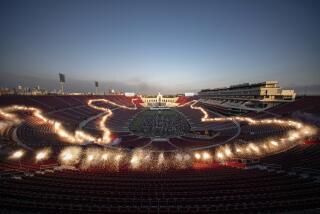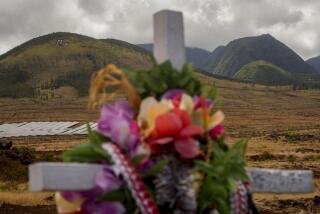Honolulu Holds Its Breath as New Year’s Tradition Looms
- Share via
HONOLULU — As traditions go, it has a lot more pizazz than waiting for a ball to fall in chilly Times Square or traipsing around tipsily to costume parties. On New Year’s Eve in Hawaii, families gather to ignite strings of 10,000 Chinese firecrackers in front of their homes for good luck.
Over the years, however, the cherished ritual has exploded into a frenzy of fireworks whose deafening noise and thick smoke make Honolulu seem like a war zone. As 2000 approaches, some residents are scrambling to find havens from what promises to be the biggest bang ever.
“Setting off a great volume of fireworks in a short period of time in a densely populated area is the formula for disaster,” said Austin Dias, who loved fireworks as a child growing up in rural Hawaii but now fears for his elderly mother-in-law. She suffers from lung disease and almost died after one particularly smoky New Year’s.
Gov. Ben Cayetano tried to stop “this madness” by getting the state Legislature to ban fireworks this Jan. 31, saying Honolulu had outgrown the curbside custom. But lawmakers didn’t want to be party poopers, certainly not for the millennial celebration. Instead, the Fire Department is beefing up its staff and the American Lung Assn. is trying to locate air-conditioned venues, such as movie theaters, where patrons can escape the smoke and din.
“At 12:30 a.m. last New Year’s, if you went outside anywhere in Honolulu, you could not see more than 20 feet,” said Allison Beale, director of environmental health for the lung association.
“The really young and the really old are so susceptible to the smoke,” she added, noting that it can trigger pneumonia or bronchitis weeks later. About 200,000 of Hawaii’s 1 million people have lung disease, and the state has the highest morbidity rate from asthma in the nation, in part because of high levels of mold and pollen in the air.
Hawaii residents are allowed to set off as many non-aerial fireworks as they like from 9 p.m. on New Year’s Eve until 1 a.m., although not near hospitals, hotels or homes for the elderly. The use of fireworks that soar above 12 feet is illegal, other than in licensed pyrotechnic displays, but that prohibition is largely ignored. Rockets whiz through the air and thunder overhead, spooking pets--and people.
Fireworks go on sale a week before the holiday, with the strings of 10,000 available for as little as $5, and the revelry often starts early. Clouds of nitrate and sulfur particles can hang over neighborhoods through New Year’s Day.
“Every year we send up an earnest prayer for rain,” said Gideon Awa, acting battalion chief of Honolulu’s Fire Prevention Bureau. “We’re expecting it to be a war this time because it’s the year 2000.”
New Year’s Eve has long been a family affair in the islands.
The Chinese firecrackers, which make an incredible racket, are supposed to chase away evil spirits and make room for good ones in the coming year. Hawaii families also observe other Asian customs, such as cleaning the house from top to bottom before the new year starts and eating special foods.
“Popping firecrackers on New Year’s Eve is not just Chinese culture anymore; it’s part of the fabric of Hawaii,” said state Sen. Randy Iwase, who is of Japanese ancestry and opposes a ban. “It’s a way for the family to come together. My mom always told me I had to be home on New Year’s Eve because if you’re not . . . you’re not going to be home the rest of the year. I’m 52 now, and I tell my kids, don’t go out with your friends, you’re supposed to be here.”
Dentist Philip Chang, whose family ignites strings of firecrackers in front of each entrance to his home to “bless the house,” recalls the shock of spending his first New Year’s on the U.S. mainland. “It was so quiet. All people would do is get drunk. I’m not into drinking, so that was boring.”
Cathy and Reid Silva have booked a room on the 17th floor of a Waikiki hotel to protect their 2-month-old daughter, Hannah. “I would love to stay home and burn our 10,000 string and wish our neighbors happy New Year,” Cathy said. “But we are paranoid parents.”
Awa can sees both sides of the argument. “I was brought up in Hawaii, so I enjoy it. But as a firefighter, I have to take a stand against it.” Still, he acknowledged, “my nephew and his family are coming down from Texas to get in on the fun.”
More to Read
Sign up for Essential California
The most important California stories and recommendations in your inbox every morning.
You may occasionally receive promotional content from the Los Angeles Times.










